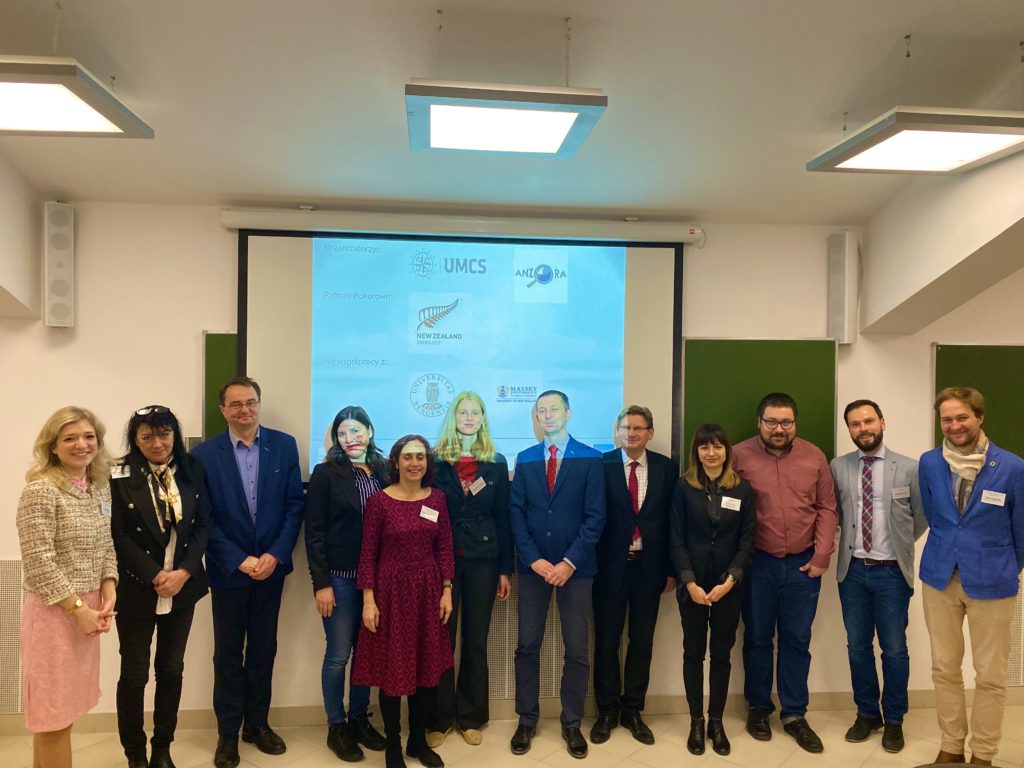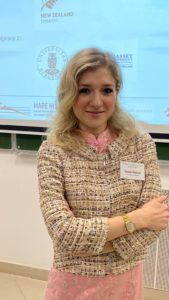Dr. Joanna Siekiera sums up this year’s annual Australia, New Zealand, Oceania Research Association (ANZORA) conference in Lublin, Poland.
![]()
On 13 December 2019, I organized the annual conference for the Australia, New Zealand, Oceania Research Association (ANZORA) in Lublin. This was the 11th edition of the ANZORA national conference, which gathers Polish scientists and enthusiasts of the Pacific region. It is worth underlining the fact that besides this venue, there are only two cyclic conferences in Europe touching upon Oceania research; the biannual conference of the European Society for Oceanists (the Netherlands) and the New Zealand Studies Association roundtable (Great Britain).

This year’s theme was “Problems and perspectives of development of the Oceania states”, and the host was the Marie Curie-Skłodowska University with its Faculty of Social Geography. The ANZORA members and many new speakers came from various disciplines and academic institutions from Poland and abroad. In total, there were 17 presenters. Besides the Univeristy of Bergen, foreign speakers represented the Western Sydney University in Australia and Université de Bourgogne in France. Finally, there were representatives of 9 Polish universities: the University of Warsaw, the Jagiellonian University in Cracow, the Andrzej Frycz Modrzewski Cracow University, the Maria Curie-Skłodowska University, the Adam Mickiewicz University in Poznań, the University of Łódź, the Adam Mickiewicz University in Poznań, the University of Bydgoszcz, and the University of Economics in Cracow. The honorary speaker was Prof. Sev Ozdowski, who was the Australian Human Rights Commissioner in 2000-2005. The Embassy of New Zealand, as annually, has taken the honorary patronage over the event. The supporting institutions were also the Massey University in New Zealand and the University of Bergen.
![]()
I had the pleasure of opening the conference with the first speech, entitled “Mare Nullius Project – perspectives of the Oceania states development”*, which gave the audience insight into the Bergen Pacific Studies research group. The “welcome”-speech was given by the host, Prof. Wojciech Zgłobicki, dean of the Faculty of Earth Sciences. The gathering was divided into three thematic panels corresponding to the interests, but also the problematic aspects of the speakers’ research. Panel I “Perspectives of Oceania development” began with a speech on international legal subjectivity in the context of the effects of climate change in Oceania. Then, speakers discussed tourism as a lost opportunity or an advantage, as well as transnational perspectives on indigenous sovereignty. After the coffee break, Panel II “Historical problems of the Pacific” started. In this part of the conference speaker focused on colonial travel writing, prehistory of the Pacific islands’ archaeometry, Rapa Nui rituals, transculturalism in art and literature, and security threats. The participants of the 11th ANZORA conference reached the midpoint of the gathering during the lunch break, as the last panel was the longest one. The “Threats to the Pacific countries and territories” panel was probably the most varied, wherein academics analysed the Australian obstacles in urban areas, Japanese and then Chinese influences in the region, cartography methods of Torsten Hägerstrand, anthropogenic threats to Micronesia, Polynesia and Micronesia, and finally the Polish input to Pacific research, as led by famous anthropologist Bronisław Malinowski.
![]()
The next ANZORA conference has already been scheduled, in accordance with the Association’s custom, for December 2020. The host of the 12th conference shall be the University of Łódź.

Dr. Joanna Siekiera is an international lawyer dealing with Pacific law, and a postdoctoral fellow on the OceanStates project. Her main interests are legal-political integration in the South Pacific, as well as maritime sovereignty of the submerged islands.
*Note: Mare Nullius is the former main title of the Island Lives, Ocean States (OCEANSTATES) project. The project title was changed in January 2021.